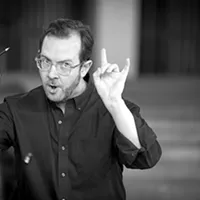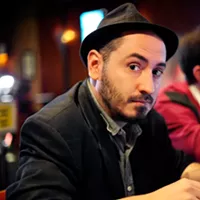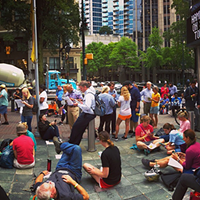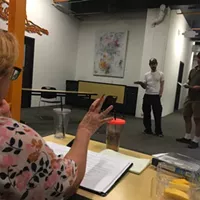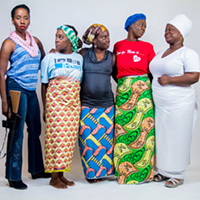Father Comes Home from the Wars takes a singular look back
Ebony and Odyssey at the Civil War
By Perry TannenbaumSometimes it's the winner who adds prestige to the prize. Despite its princely $100,000 payout from Columbia University, you probably never heard of the Edward M. Kennedy Prize for Drama Inspired by American History. The importance of the prize is likely to grow now that Lin-Manuel Miranda has snagged the fourth annual award for his megahit musical, Hamilton.
Last Monday's announcement came just a wee bit too late for Actor's Theatre of Charlotte to bask in the newborn Kennedy afterglow in their pre-publicity for Father Comes Home from the Wars (Parts 1, 2 and 3), which opened last Wednesday. Playwright Suzan-Lori Parks won the 100 grand for Father last year, before the Kennedy Prize was important enough to be noticed by The New York Times.
As the first African American woman to take the Pulitzer Prize (for Topdog/Underdog), Parks isn't exactly vaulting from obscurity with her latest win. Nor is she exactly rising from poverty with the cash, though the 2002 Pulitzer chipped in $10,000, also from Columbia. After Parks won the $300,000 Gish Prize last October, the LA Times reported that Parks had banked over $1,000,000 in arts awards during her career, including the genius grant from the MacArthur Foundation.
So what did Parks bring our way during the waning days of Black History Month? Notwithstanding the trilogy connotations of the title, amply fulfilled by the three-hour running time (including two 10-minute intermissions), Father Comes Home is actually the first installment in a longer nine-part project. Until subsequent installments are unveiled, Wars remains a misnomer, for the only war anyone goes off to — or returns from — is the Civil War.
Although our protagonist, Hero, appears in all three parts, it wasn't until he returned in Part 3 that I began to feel we were watching something greater than the sum of three one-act plays. It also became clearer that Parks has her own take on deconstructing history.
On the one hand, she formalizes it much in the same way Aeschylus did when he added to the Homeric legends of the Trojan War in the Oresteia 2500 years ago, inaugurating the art of theatre on the Greek stage. Three slaves who work alongside Hero in the opening act of Father Comes Home, as he weighs the pros and cons of squiring his master in the Confederate Army, will disappear by the time he returns a year-and-a-half later. They're replaced by three Runaways, hiding by day at the slave cabin until they can further their escape under the cover of darkness.
The Runaways talk to the only holdovers at the Confederate Colonel's plantation, Hero's wife Penny and Homer, but they also begin talking to us more and more, like members of a Greek chorus. It's when Hero's long-lost dog returns from the war that we begin to see the modernistic aspect of Parks' treatment. When we learn that Hero has changed his name to Ulysses, we realize that Penny is his Penelope — and that the Greek hero is serving as a thin mythic template over Parks's story, much as he did in James Joyce's Ulysses.
But Parks also tosses a light sprinkling of absurdist anachronisms into the spectacle. A couple of these appear before intermission as one slave nurses a drink in a Starbuck's cup and Hero takes off a set of headphones as he makes his decision. Relatively subtle touches that one theatergoer sitting with us in the front row could decry as a mistake.
These time-warp incongruities multiply when we return to Texas. One Runaway sports a doo-rag and twirls a yoyo, another wears a Blank Panther beret and reads Ebony, and the third wears a vinyl vest and totes a peacenik handbag. I'm guessing this is Parks reminding us that when we journey back to yesteryear, we bring today's eyes to watch what happened.
No fewer than four slaves kick off the evening, speculating on whether Hero will go to war, evidently unaware of the title of the show. Two other slaves, Homer and the Oldest Man, are noncommittal in the general wagering, but both are generous with their input. We might equate Hero's vacillation with the preening of undecided voters, loving the attention of the media who inflate their importance. But perhaps the thing to perceive here is the fact that any big choice given to a lifelong slave is a breath of freedom.
Homer's reluctance to counsel Hero is linked to an ancient grudge. When Homer made his run for freedom years ago, it was Hero who ratted him out and delivered the master's harsh punishment. Such episodes of Uncle-Tom loyalty are a big part of the reason that the Colonel is offering Hero the opportunity to accompany him onto the battlefield — and promising Hero his freedom if he survives.
But what are the chances that Hero will survive or that the Captain will keep his promise? Fear piles upon fear when Hero realizes that he will undoubtedly face the lash if he disappoints his master and refuses to go. Another layer is heaped on when the slaves realize that only a serious injury will serve as a sufficient excuse for Hero's dereliction, for Hero must now suffer the same indignity he inflicted on Homer.
It's at this point in Part 1, when hero has made up his mind in Penny's favor, where Sidney Horton's otherwise flawless direction falters. The knife hovers so long and threateningly over Hero that the tension breaks before the episode is really over. My surprise over this lapse only increased during Part 2, in the heat of battle, when the Colonel parleys with a wounded Union soldier that he has captured and locked in a wooden cage. Action here made me wince, leaving no doubt of the Captain's cruelty.
In a meticulously crafted performance, Jonavan Adams brilliantly fuses the three parts together as Hero. As robust and broad-shouldered as he is, Adams is supremely wishy-washy, so his Ulysses-like cunning and soulfulness can change to arrogance or cravenness in the blink of an eye. Looking up to him with love and yearning in her eyes — and maybe a sliver of seduction — April Jones is aptly coupled with Hero in Part 1. But the worm turns dramatically in Part 3, where it's Penny's turn to make a suspenseful choice, and the grit that Jones plants within her comes to the fore.
After making so much of so many mellow and insouciant roles before, it's refreshing to see how deeply Jeremy DeCarlos sinks his teeth into the waspish resentfulness of Homer, who turns out to be the truest Penelope in the drama after limping around so long. If you've had your fill of American courtesy and courtliness between Civil War combatants on stage and screen, you'll love the fierce in-your-face animosity between Craig Spradley as the Colonel and Stephen Seay as his captive, Smith.
Among the other slaves, Bobby Tyson distinguishes himself when he transforms into Hero's long-lost dog Odyssey in Part 3, silencing Homer himself as he chronicles Ulysses' battlefield adventures. The pooch's life story had only 38 lines in the Homeric epic, but here Parks gives him two lengthy monologues, and Tyson makes a comical meal out of each one. The wooly jacket designed for him by costumer Carrie Cranford clinches his eclat.
Speaking of...
-
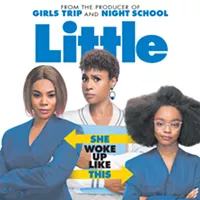
Advanced Screening to Little
Apr 2, 2019 -

Charlotte 'Hamilton' Sales Go Awry After Bot Interference
Aug 1, 2018 -
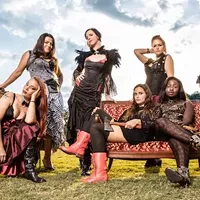
Actor's Theatre Takes on Lizzie Borden in New Rock Musical
Aug 1, 2018 - More »
Latest in Performing Arts
More by Perry Tannenbaum
Calendar
-
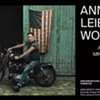
ANNIE LEIBOVITZ / WORK @ Mint Museum Uptown at Levine Center for the Arts
-

Trap & Paint + Music Bingo @ Blush CLT
-
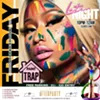
Trap & Paint (Hookah Edition) @ Blush CLT
-

BookTok Sensation RC Luna Comes to Charlotte – Author Signing Event @ The Trope Bookshop
- Sat., Aug. 30, 11 a.m.-1 p.m.
-

R&B Sip & Paint + Comedy Show @ Blush CLT



